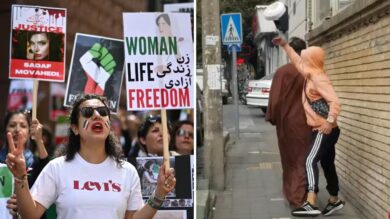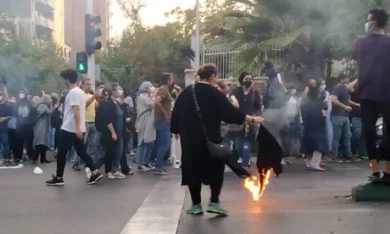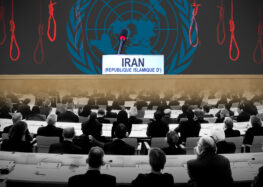The Islamic Revolutionary Guard Corps (IRGC) has built a vast economic empire that extends across key industries in Iran and operates through illicit global networks. This empire, sustained by corruption, monopolization, and smuggling, provides the financial backbone for the IRGC’s domestic repression and regional terrorism. While ordinary Iranians face economic hardship, inflation, and unemployment, the IRGC continues to consolidate wealth and power, using state resources to fund proxy militias and human rights violations. This article investigates the economic control exercised by the IRGC, its methods of wealth generation, and the impact of corruption on Iran’s society and regional stability.
1. The Rise of the IRGC’s Economic Power
A. Post-Revolution Expansion
The IRGC was established after the 1979 Islamic Revolution to safeguard the new regime. Over time, it expanded its influence beyond the military sphere, gaining control of Iran’s key industries under the guise of national development. The Iran-Iraq War (1980-1988) accelerated this shift, with the IRGC awarded lucrative reconstruction contracts after the conflict.
B. Strategic Industries Under IRGC Control
The IRGC’s economic empire includes a diverse range of industries, such as:
• Oil and gas
• Construction and infrastructure
• Telecommunications
• Banking and finance
• Arms manufacturing and smuggling
The organization’s economic arm, Khatam al-Anbiya Construction Headquarters, is the largest contractor in Iran, securing no-bid contracts for major state projects.
2. Corruption as a Foundation of Economic Power
A. Manipulation of State Resources
The IRGC exploits state contracts and monopolies, preventing private sector competition. Many contracts are awarded without oversight, leading to mismanagement and delays in public projects.
Example:
The IRGC was awarded contracts to construct dams and transportation infrastructure, but corruption and embezzlement led to unfinished or poorly executed projects.
B. Smuggling and Black Market Activities
The IRGC operates smuggling networks to evade international sanctions. These operations include:
• Oil smuggling to bypass export restrictions.
• Drug and arms trafficking through Iran’s ports and borders, often controlled by IRGC forces.
This black-market economy has become a critical revenue stream, funding both domestic repression and external military operations.
3. Funding Repression and Human Rights Violations
A. Financing Security Forces and Surveillance
The IRGC directs a portion of its revenue to domestic security operations, including funding for:
• The Basij militia, which suppresses protests.
• Cyber warfare units that monitor activists, journalists, and dissidents.
• Prisons and detention centers notorious for torture and executions.
The IRGC’s wealth ensures that it can maintain loyalty within the security apparatus by providing financial incentives and resources.
B. Crackdown on Protests
Protests such as the 2009 Green Movement, 2019 fuel price protests, and the 2022 Mahsa Amini demonstrations were met with deadly force. The IRGC used its financial resources to fund mass arrests, deploy security forces, and impose internet shutdowns to prevent communication.
4. The IRGC’s Role in Regional Terrorism
The IRGC’s financial empire extends beyond Iran’s borders, funding terrorist groups and proxy militias in the Middle East. The Quds Force, the IRGC’s elite external operations unit, leads these efforts.
A. Hezbollah (Lebanon)
The IRGC provides an estimated $700 million annually to Hezbollah, enabling the group to maintain a military presence in Lebanon and engage in conflict with Israel. Hezbollah also supports Iran’s interests in Syria and Iraq.
B. Houthis (Yemen)
The IRGC supplies ballistic missiles, drones, and military advisers to the Houthi rebels, who have attacked Saudi Arabia and the UAE. This support prolongs Yemen’s civil war and humanitarian crisis.
C. Shia Militias (Iraq and Syria)
The IRGC funds and arms Shia militias in Iraq and Syria, many of which have committed war crimes. These militias act as Iran’s proxies, targeting U.S. forces and regional rivals.
5. Economic Impact on Ordinary Iranians
While the IRGC’s empire grows, Iran’s economy suffers from corruption, mismanagement, and sanctions. The Iranian rial has lost significant value, leading to skyrocketing inflation and widespread poverty.
A. Unemployment and Business Suppression
• The IRGC’s monopolies have crowded out private businesses, limiting opportunities for entrepreneurship.
• Youth unemployment remains high, contributing to social unrest.
B. Inflation and Rising Cost of Living
• Basic goods and services have become unaffordable for many Iranians due to the devaluation of the currency.
• Sanctions targeting the IRGC have further strained access to essential goods, exacerbating economic hardships.
6. International Sanctions and Countermeasures
A. Sanctions Targeting the IRGC
The United States and European Union have imposed sanctions on IRGC officials and affiliated companies. These measures aim to:
• Freeze assets and restrict financial transactions.
• Disrupt arms smuggling and illicit trade networks.
However, the IRGC has adapted by using front companies and cryptocurrency to continue its operations.
B. Calls for Global Terrorist Designation
Many experts and human rights organizations advocate for the global designation of the IRGC as a terrorist organization. Such a designation would increase pressure on Iran and limit the IRGC’s ability to fund its activities.
7. Recommendations for Action
A. Strengthen Sanctions Enforcement
• Expand international cooperation to close loopholes in sanctions enforcement.
• Target financial networks used by IRGC front companies.
B. Support Iranian Civil Society
• Provide funding for independent media and digital security tools to protect activists.
• Promote economic reforms that reduce the IRGC’s control over Iran’s economy.
C. Enhance Intelligence and Counterterrorism Efforts
• Improve intelligence-sharing among allies to monitor IRGC activities.
• Support regional partners in countering IRGC-backed militias.
Conclusion
The IRGC’s economic empire is built on corruption and exploitation, funding repression and terrorism at the expense of the Iranian people. To weaken the IRGC’s grip on power, the international community must implement stronger sanctions, disrupt illicit networks, and support those fighting for freedom and justice in Iran.
Join Our Newsletter!
Stay informed with the latest updates, news, and ways to take action in the fight for justice and global security. Sign up now to get updates delivered straight to your inbox!





